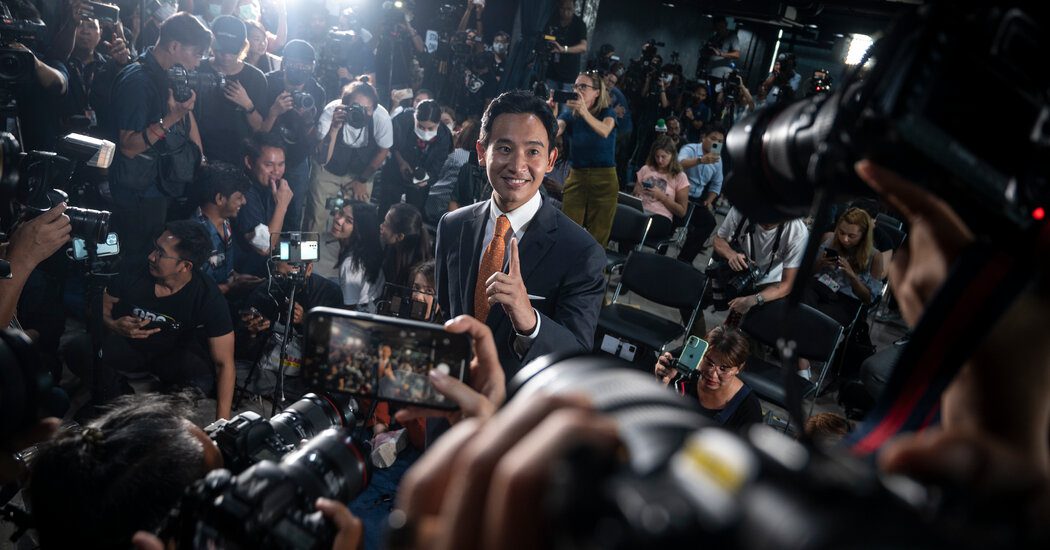Global Courant 2023-05-15 16:04:17
The two opposition parties that won the bulk of the vote in Thailand’s general election over the weekend said on Monday they had agreed to form a coalition government. However, it remained unclear whether the ruling junta would hand over power easily.
The results of the election were a sharp rebuke to the country’s military leaders, who have ruled Thailand since the coup in 2014. While Thailand is a country where coups are not uncommon, it had never been under military rule for so long.
Many voters, disillusioned by the endless cycle of putsches and protests, used Sunday’s election to overwhelmingly demonstrate their desire for change.
“People have had enough of a lost decade,” Pita Limjaroenrat, the leader of the progressive Move Forward Party, told reporters on Monday. “Today is a new day.”
The Move Forward Party — which has called for an overhaul of the military and an amendment to a strict law criminalizing criticism of Thailand’s monarchy — won 151 seats in the 500-member House of Representatives. The result defied opinion polls, which had predicted a strong victory for Pheu Thai, the country’s largest opposition party founded by former Prime Minister Thaksin Shinawatra.
Pheu Thai won 141 seats, which, like Move Forward, fell short of a clear majority. The two sides announced in separate press conferences on Monday that they had agreed to work together to form a government.
Mr. Pita has led the effort to build the coalition. He said five parties, including Pheu Thai, had already joined him, increasing the opposition’s control of parliament to 309 out of 500 seats. “It is safe to assume that we have secured a majority in forming a government,” Pita said Monday.
Prime Minister Prayuth Chan-ocha, the general who seized power in the 2014 coup, said on Sunday that he “respects the democratic process and the election outcome”. His party, United Thai Nation, won only 36 seats.
Mr Pita’s quick work in assembling a coalition reduced some uncertainty about what many Thais have described as the most sweeping election of their lives. But it was still unclear whether he would be allowed to lead the country as prime minister.
The military-appointed senate, which has the power to choose the prime minister through a joint vote in parliament, can still remove Mr Pita from office.
Many analysts questioned whether the Senate would tolerate election results that threaten the status quo. Move Forward has focused on institutions and policies once considered sacred in Thai society, including abolishing compulsory military service and reducing penalties for the law protecting the monarchy from criticism.
With Pheu Thai in government, it could put the party’s founder and one of the army’s biggest rivals, Mr Thaksin, back at the center of the country’s politics. The king must also ratify the appointment of prime minister.
At a press conference, Mr. Pita said he was not concerned about opposition from the Senate. “With the consensus that emerged from the election, it would be quite a high price to pay for anyone considering abolishing the election result or forming a minority government,” he said. “And I don’t think the people of Thailand would allow that.”
But if history is any indicator, the military, which has dominated Thai politics for decades, is unlikely to relinquish power any time soon. In addition to staging a dozen coups within a century, Thai generals rewrote the constitution in 2017 to stack the Senate with allies and ensure the military would have the power to determine the country’s prime minister.
Gregory Raymond, a lecturer who researches Southeast Asian politics at the Coral Bell School of Asia Pacific Affairs, said there is still a possibility that the two military proxy parties – United Thai Nation and Palang Pracharath – will get enough seats together can glean to build their own claim to government. “I think that is still the last scenario. It would be very undemocratic, but cannot be ruled out at the moment,” said Mr. Raymond.
Analysts warned that the senate’s choice to block Mr Pita’s nomination was likely to spark protests in Thailand, plunging the country into further political turmoil.
“I think the response will be much more dangerous than it was four years ago,” said Purawich Watanasukh, a research fellow at Thailand’s King Prajadhipok’s Institute, referring to the country’s previous elections. “At the moment, many people have Pita in mind as their new prime minister. If Pita cannot be prime minister and Move Forward cannot form a government, it will break people’s hearts. And it will be very, very bad.
In 2020, the country’s Constitutional Court dissolved the Future Forward Party, the previous iteration of the Move Forward Party, after the election. Tens of thousands of Thais took to the streets of Bangkok to protest the decision.
What began as a protest for democratic reforms soon grew into a pro-democracy movement calling for control of the Thai monarchy, a subject once considered taboo.
The country’s conservatives are likely to step up their campaigns in the coming days to block Move Forward’s rise. Last week, a conservative candidate petitioned the Election Commission and the National Anti-Corruption Commission to investigate Mr Pita for failing to disclose that he owned stock in a now-defunct media company he inherited from his father. By law, candidates for MP are not allowed to hold shares in a media company.
Mr Pita brushed off the petition, saying he had already declared the shares to authorities.
But Move Forward will have to manage many competing interests to keep the coalition intact. It was the only major party to push for an amendment to a law criminalizing criticism of the monarchy, arguing that the law had been used by royalists to prosecute demonstrators taking part in pro-democracy demonstrations.
On Sunday evening, Mr Pita said he would still continue to amend the royal protection law.
Paetongtarn Shinawatra, Mr Thaksin’s youngest daughter and a Pheu Thai candidate for prime minister, said on Monday she was “ready to talk” about the issue of young people accused of breaking the law known as Article 112 But she added that her party would not vote to abolish the law altogether.
“We will have to tell the Move Forward Party that we do not support the repeal of Article 112,” she said.
Pirada Anuwech contributed reporting.








